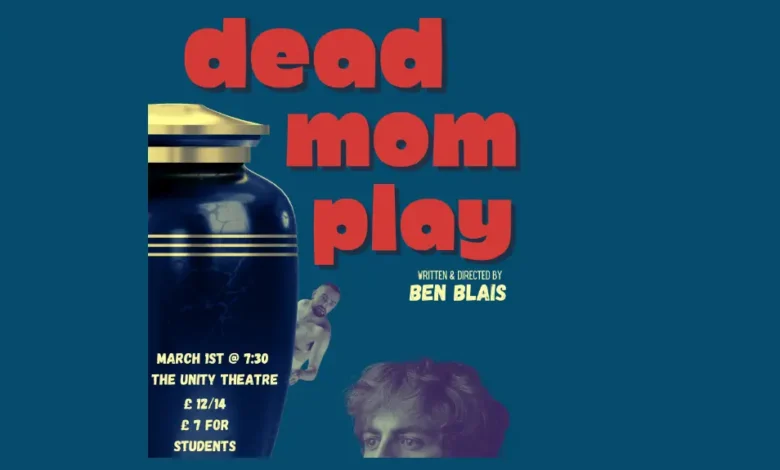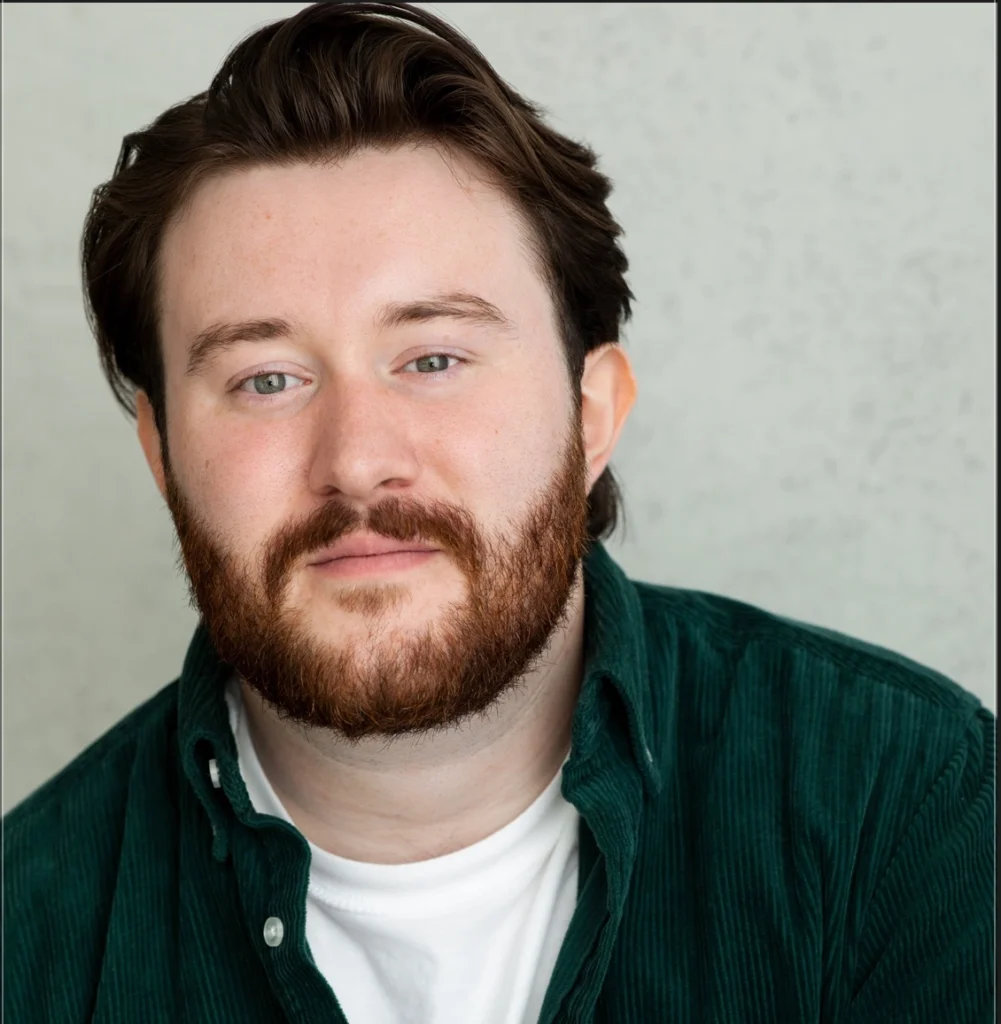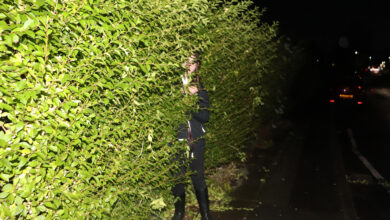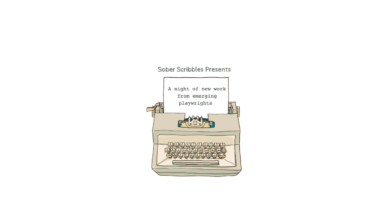
In Conversation – Ben Blais And Griffin Bellah, Dead Mom Play
Have you ever experienced a play that made you laugh and cry in equal measure? Dead Mom Play, a dark comedy about a young man confronting his mother’s death, has resonated with audiences and critics alike. With reviews highlighting its “funny and moving” nature (Edinburgh Festival Fringe) it’s a play that promises to stay in the mind for a long time. You are highly recommended to catch a performance at the Unity Theatre on Saturday 1 March 2025.
In the meantime, Liverpool Noise explored the play’s emotional impact and its powerful message by having a chat with Ben Blais, the playwright and director behind Dead Mom Play, and actor, Griffin Bellah who plays Charlie.
Liverpool Noise: Ben, what actually prompted you to write Dead Mom Play in the first place?
BB: Dead Mom Play started as a one man show. I needed to write a piece of theatre for my third year dissertation at LIPA, and the only thing that piqued my interest was diving into the grief from my mom’s death in 2019. I hadn’t really written anything before that dissertation honestly, but once I sat down, the words just flew out of me. I ended up with about a half hour of essays, mostly comedic, and a bit of poetry. Then I had to present it, which was terrifying, but it went over really well, and the actors in my year were super supportive and encouraging.
My dad was also a big factor in the development of the show. He’s an excellent writer, and a staunch critic, of all things really, so when I had his stamp of approval, I knew I had stumbled into something real and worthwhile. Sometime in the autumn of 2023 I started adapting my essays into a three person play, and over the next few months, decided to go to the Edinburgh Fringe!
My goal at the time was to write something so that I had a play to direct, but after working with a dramaturg, the lovely Jay Potter, I found my passion for directing bled into playwriting as well. Because I wrote and directed Dead Mom Play, I was able to shape it into exactly what I wanted it to be. I know every beat and important moment we need to hit.
That being said, I’m not a complete creative control freak, I leave plenty of space for my actors to make the choices they feel the most connected to, and I would say overall the process is collaborative. That’s another reason I wrote the play. The first few months out of drama school can be a rude awakening. No one is going to give you a leg up in the industry, and every teacher I’ve ever had has given me the same advice: make your own work. So I did!
The thing I missed most about school wasn’t even performing, it was the rehearsal room. It was collaboration and the act of crafting a show with people you love. I wanted to write something I know intimately and something that is true to me, and I definitely felt like I needed to get this off my chest, before even thinking about writing other plays.

“My goal is to make people laugh then cry then laugh then cry in rapid succession. It’s life right?” – Ben Blais
LN: The play balances dark humor with poignant moments of grief. Was this a conscious decision from the outset, or did the balance evolve during the writing process?
BB: It was definitely a conscious decision, but I would also say I couldn’t write it any other way. Humour is intrinsically how I deal with difficult subjects, and this play may or may not be literally about my life, who’s to say really, but any attempt to write honestly about the serious subjects in my life have to be backed up with humour. And once we give the audience permission to laugh at the odd aspects of a miserable situation, they’re much more receptive to digesting uncomfortable ideas. It also makes those ideas hit harder at times. My goal is to make people laugh then cry then laugh then cry in rapid succession. It’s life right? How do we balance the extreme highs and lows in our lives? We use humor. And we’re still able to sit in those awful moments and be present, but humor just makes those moments a little easier.
LN: Death is portrayed as a dry, engaging character. What inspired this particular interpretation of Death, and what effect do you hope it has on the audience?
BB: I think the pedestrian nature of Death really interests me. Often people in the throes of grief comment on how the world keeps spinning around them, and how something that takes up so much space in their lives, takes up little space in the real world, so I wanted to portray death not as a mystical or monumental figure, but just as some guy. Death is abundant and honestly, unremarkable, yet is also terrifying to most people, including myself, but at the end of the day, it’s random. My good friend Joe Bellis is one of the funniest people I know, and so I took this pedestrian depiction idea and paired it with Joe’s personality, essentially, and told him to clear his calendar in August, because we were going to the Fringe. It actually took him a couple months to read the script, but I imagine it’s hard to say no when somebody has written a character just for you.
Joe is an incredible actor, and I fully trusted him to switch with expertise between the bumbling comedic relief, and silent, menacing Death I needed him to be. Because Joe can play both charming and villainous, I hope the audience is left with a very human, very real impression of Death. A high calibre actor is an actor interested in playing the truth of every moment, and Joe is not only a high caliber actor but also an excellent human being, and friend.

“I think Dead Mom Play is an incredibly unique lense through which anyone will feel privileged to have looked through.” – Griffin Bellah
LN: Griffin, Charlie is described as a “nervous ticking time-bomb” and a “bundle of nervous energy.” How did you physically prepare for and embody such a physically and emotionally demanding role?
GB: I’ll start by saying that you’re very right in your saying that the role is demanding, and was especially physically taxing in the kiln that is Edinburgh Fringe venues so I feel blessed to be coming back to this project in the winter. I believe that Charlie is just as nervous as the rest of us when it comes to sharing his work on stage with an audience, so riding those same nerves that appear in myself is a great way in. Its just a matter of not letting them take over. So I balance them, and the literal and figurative running in circles in this piece, with the breath. And that’s either by knowing all the places in which I’m gonna need a submarine’s air supply worth of breath to make it through a punctuation drought. Or to take a deep breath and sit into whatever excellence my colleagues and friends are providing me with to react to. I suppose it’s easier to be vulnerable on stage when all you have to do is listen to your team do great work and react.
LN: The play shifts between comedic and dramatic moments. How do you navigate those rapid shifts in tone and maintain the emotional truth of the character?
GB: One thing that’s always key with comedy (in most cases) is that you as a character can’t find it funny. Suffering is often at the center of most comedy anyway. By focusing on what’s really happening to Charlie, being told he was too ugly to post on Facebook as a child for example, that hurts! And by leaning into that hurt we often find the the truth that is often present in all good jest. That isn’t to say keeping a straight face whilst Joe eats my mom’s lasagna with a scythe is easy, but doing it a few hundred times with the threat of your imagined mother being whisked away into the unknown is a sure-fire to get you there, comedy or otherwise.
LN: What was the most challenging aspect of playing Charlie, and what did you learn about yourself or about acting through this experience?
GB: I think that there’s something incredibly opposite to the actor in what Charlie is. In acting we’re often told to lean into what’s happening on stage with us, but at many points in the play It’s my job as Charlie to ignore the needs of a pleading mother in pursuit of some vapid goal of recognition from others or even the audience. Charlie pushes the other characters and potentially the audience to a point of loathing and when that pushing requires speaking an intercut, but entirely unrelated monologue to your scene partner’s speech you’ve got a recipe for a brain fart.
It takes a lot of rewiring to play a character lost in his den of self-loathing when most of us were inspired by heroic characters when we were kids. It’s a challenge I’ve come to adore though.
LN: What do you hope audiences take away from Dead Mom Play, and what has been the most rewarding part of bringing this story to life?
GB: Well, besides the fact that I now have the ability to expel sentences that require 150% of a normal human’s lung capacity, I think Dead Mom Play is an incredibly unique lense through which anyone will feel privileged to have looked through. It’s through the specificity of some incredible verbal gymnastics that I’ll attempt to achieve that we find ourselves at the core of what Ben has created: a vivid depiction of a person finding their way through the tunnels of loss that we’ve all been discombobulated in at some point. Catharsis is an overused word, but getting to find my way through those tunnels to the light on the other end with an audience by my side may be the definition of the word…
LN: It’s going to be a great night! Thank you both!
Steve Kinrade was talking to Ben Blais and Griffin Bellah for Liverpool Noise
Dead Mom Play
Saturday 1 March 2025
Unity Theatre
Tickets
Dead Mom Play on Instagram @dmplay2024.







